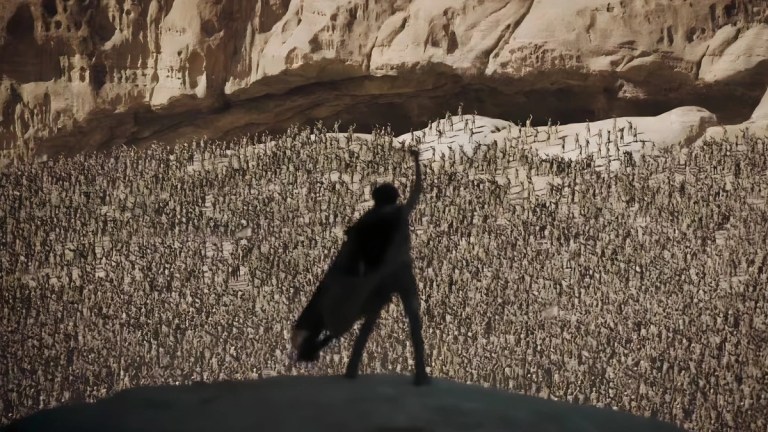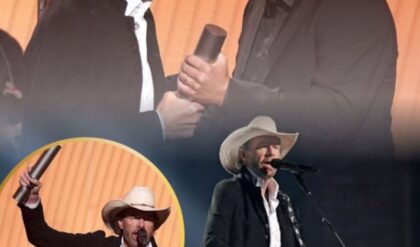Denis Villeneuve is already writing his adaptation of Dune Messiah, but if he wants to be faithful to the novel, he has his work cut out for him…

When Denis Villeneuve‘s Dune: Part One opened in 2021, it only took Warner Bros. six days to announce the sequel. However, when Dune: Part Two opened this past March 1—despite doing huge business and clearly paving the way for a third chapter—it took the studio over a month to confirm a film of Dune Messiah was in development. Why the delay? Well, lots of possible reasons, actually.
Even though Dune: Part Two is likely to soon cross the $700 million mark at the global box office, it was an expensive movie to make at a reported $190 million ($25 million more than Part One), plus a marketing budget that likely took that final price tag well over the $300 million mark. Once you factor in that half the box office is going to theaters, you have a low margin for profitability, at least theatrically. A third movie means the above the line talent (actors, directors, producers, etc.) automatically get a bump in the form of salary and/or profit participation, which means even if production costs remain on par with Part Two, a third film will have to perform far higher than $700 million to break even.
This all boils down to the fact that Dune is not Star Wars, nor will it ever scale to those heights of profitability. Even dating back to the ramp-up to the original David Lynch film, Hollywood has always referred to the property enticingly as “Star Wars for adults,” but therein lies the rub: “for adults” means you’re automatically scratching young children off the list as well as a large percentage of teenage audiences. You won’t see Dune pulling the trusty four quadrant demographics that Star Wars does, because Frank Herbert’s sci-fi is more than laser swords, spaceship dogfights, dashing fantasy heroes, and Joseph Campbell-style mythmaking.
The Duniverse is politically complex, with flawed/morally gray characters also imbued with a distinct air of Shakespearean tragedy. In other words, it’s a bummer. The best the franchise can aspire to is an IP built on bleak twists like Planet of the Apes, whose highest grosser Dawn of the Planet of the Apes did $710 million… about what Dune: Part Two is going to do worldwide.
But that’s all simple blockbuster economics. Beyond that there are some major textual reasons why Dune Messiah will be a challenging film to pull off in a satisfying way—or in a way that doesn’t make an audience’s skin crawl.
The Big Heel Turn
Although sections of the Dune Messiah book were written concurrently with the original 1965 Dune novel, the 1969 sequel was by all accounts received with far less enthusiasm than its predecessor. This reaction can be chiefly ascribed to Herbert’s pulling the rug out from under readers by flipping Paul Atreides from perceived hero to mass-murdering dictator whose Fremen jihad has killed tens of billions across the galaxy.
According to Ryan Britt’s book The Spice Must Flow, the manuscript so incensed John W. Campbell—a champion of the first Dune—that he refused to serialize it in Analog magazine as he had the prior novel. It wound up being doled out in the pages of Galaxy, Analog‘s chief competitor before arriving in hardcover. Further disappointing reviews and sales reflected Campbell’s unfulfilled desire to see sci-fi stories led by “strong men” who “make a monkey’s uncle out of malign fates.” Clearly that’s what fans were expecting as well, and that is not what Herbert gave them.
Villeneuve’s Dune: Part Two even more clearly foreshadows this aspect. The “Paul is bad, actually” interpretation of Herbert’s work falls in line with Villeneuve’s ultimate vision for his Dune trilogy, as he confirmed in his interview with Den of Geek.
“Paul Atreides is not a hero,” Villeneuve told us. “Paul Atreides is a tragic figure that becomes negative at the end.”
Revenge of the Sith notwithstanding, that heel turn may not be something audiences want to see, even if Timothée Chalamet‘s cheekbones are still gorgeous. Lynch tried to tiptoe around Paul’s terrible purpose in his own film, as well as his unmade sequel script, perhaps wisely. As discussed in my own book A Masterpiece in Disarray, Lynch’s decision to focus on the spiritual side of Herbert’s story rather than the political is the pivotal difference between his and Villeneuve’s approach.
Little Major Action
As it exists on the page, the Dune Messiah novel also follows the Hegelian Dialectic of being the antithesis to the original thesis that was Dune. Where the first book was bountiful (412 pages), Messiah is comparatively lean (256 pages). Where the first book was sprawling in terms of characters and settings, Messiah is fairly contained to Paul and his small orbit amid the palaces and city streets of Arrakeen. Where the first book features much external incident (i.e. battles), Messiah is more cerebral, concerned foremost with the five-dimensional chess game the conspirators against Paul are playing, especially considering their target can see the future. It says a lot that an actual worm heist planned by Paul’s enemies is executed entirely “off-camera” in the book, with little detail.
Where the first book ends Paul’s story on a triumphant note (with some anxiety of what is to come), the follow-up finds our hero in emotional and political freefall, and things only get worse from there. By the bittersweet end, Paul has lost his sight, his empirical power, and his beloved Chani. That is the price paid for the destruction of his enemies and the safe birth of his twin children Leto II and Ghanima. Our final glimpse of Paul has him walking off into the desert as a blind nomad doomed to die, yet declaring “now I am free” as he wanders toward exile. Up until that point, his life had been on rails, a “terrible purpose” predicated by the Bene Gesserit who set it in motion, as well as the Fremen population Paul trained to execute it. His 12-year messianic reign as Arrakis’ spice lord left the legacy of a dictator who oversaw a galactic bloodbath.
Jason Momoa Marries Who?!
Not only is Paul shown to be a false messiah, his standing as the central protagonist of the Dune Chronicles is also rendered false with the return of House Atreides’ great swordmaster, Duncan Idaho, as a reanimated, ghoula-version of himself. Even the term “ghoula” brings to mind the Jewish mythological figure of a Golem, and like the Golem Duncan looms large as the only recurring figure in all six of Herbert’s Dune novels. This is good news, as it means a return of the most bodacious Jason Momoa is inevitable. The bad news is the Duncan ghoula and the character of Paul’s little sister, Alia, share a sexually charged romantic subplot that would be gross enough with him just being a revived dead body, but is all the ickier for the fact that he’s at least 40 years old and she’s 15.
While Momoa is currently 44, this age discrepancy will luckily be mitigated (somewhat) by the fact that Alia is set to be played by 28-year-old Anya Taylor-Joy. We don’t know what age the character of Alia will be within the Dune Messiah film itself (Taylor-Joy can come off pretty young), but the jailbait aspect will likely not be present… while the May-December thing definitely remains.
Will this mean that the Messiah movie will take place considerably more years after Dune: Part Two than in the novel where it’s said to be a 12-year time jump? Probably so, especially considering that Alia was a 4-year-old by the end the first book, yet is only an unborn fetus at the end of Part Two. One of Alia’s characteristics is her rapid maturity, though, so it’s possible Taylor-Joy could be playing a girl who is a teenager that looks much older. Our money is on a bigger time jump, at least two decades after the events of Part Two.
Denis Villeneuve’s Changes
One of the biggest changes Villeneuve brought to the table was his version of Chani, who rather than being the docile follower/child-bearer to Paul from the book is a much more independent thinker who nevertheless still loves Paul.
“In the book, Chani is a believer,” Villeneuve explained to us in February. “In this adaptation, Chani is part of a group of Fremen that don’t believe in this idea of a messianic figure. I did that for the audience to feel that the Fremen are in a society that is more complex, that everybody does not believe in the Bene Gesserit idea. This contrast gave me the possibility to have some perspective on Paul at the end.”
That “perspective” had Chani essentially closing the door on Paul in the final shot of Part Two, riding a sandworm away from Arrakeen in disgust that her beloved would choose to marry Irulan in order to ascend to the throne. In the book he makes it very clear to everyone that the marriage is only a formality, and that Chani will remain his main squeeze. Literary Chani is totally cool with this too, but Zendaya‘s Chani definitely is not. What does this mean for the third film? It’s possible Chani will reunite with Paul somewhere in those years between films and it will simply pick up where the book does, with her trying desperately to conceive child heirs for/with Paul and Irulan sabotaging those efforts.
Another possibility is hinted at in Part Two, with Lady Fenring’s child conceived with Feyd potentially coming into the picture in place of hereditary heirs. There are limitless other possibilities, but the fact is that 2005’s Star Wars Episode III: Revenge of the Sith pretty much stole Messiah‘s childbirth plot beat-for-beat, with Anakin/Paul foreseeing Padme/Chani’s death during the birth of his twins. If Villeneuve is smart he will take the opportunities afforded by his changes and bring Chani down a different path.
Another quandary: At the end of first Dune book, Paul orders the Emperor to send the Great Houses of the Landsraad orbiting Arrakis back, but in Villeneuve’s film the houses refuse to accept Paul’s rule, so he orders his Fremen to attack them. Does this negate Paul’s need to marry Irulan? It’s possible the attacks were merely a show of force, and afterward some of the houses relented. Whatever the case may be, the change may necessitate an explanation of some kind in the third film.
Dune Messiah is a challenging book to adapt, but Villeneuve has proven himself a deft story craftsman who is bringing Herbert’s narrative to the 21st century in great style. We have no doubt the trend will continue into the next film.




